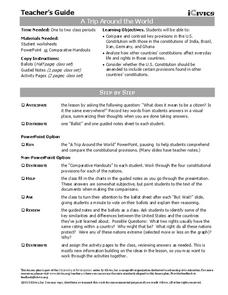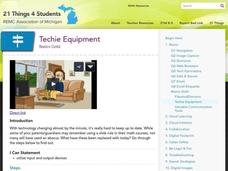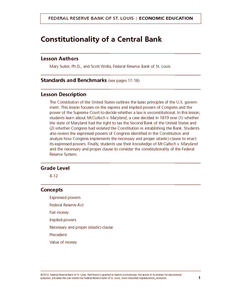Center for Civic Education
Constitution Day Rap
Engage your class while learning about the US Constitution with this fun primary grade social studies lesson. After viewing a picture of the US Constitution, young learners piece together a US flag using stars and stripes with facts...
iCivics
A Trip Around the World
How do the rights of citizens in other countries, such as India, Germany, Brazil, and Iran, compare to those of Americans? Take a closer look at the provisions of various foreign constitutions, and compare and contrast the protections...
Bill of Rights Institute
The Gilded Age, Robber Barons and the Rise of Big Business
Survival of the fittest! Scholars investigate an AP review video to discover the era of big business during the Gilded Age. Viewers examine the place of Robber Barons in society and its impact on the workforce in America. This is the...
Digital History
The Crisis of 1833: Tariffs and Nullification
This resource offers a detailed review of the events that led South Carolina to nullify the Tariffs of 1828 and 1832, as well as to pass the Nullification Ordinance, which questioned the federal government's authority to enforce any law...
Digital History
The Whiskey Rebellion
Can you imagine an army of 5,000 rebels prepared to march against the United States government over...whiskey? This is exactly what happened in 1794, and your young historians will be fascinated to read about the events that led up to...
Judicial Learning Center
The Power of Judicial Review
Marbury v. Madison is arguably the most important landmark case in the history of the Supreme Court. A fact-filled lesson provides background information about the case and two others related to the concept of judicial review. Scholars...
Judicial Learning Center
About Federal Judges
Not just anybody can do the job of a federal judge, but according to the United States Constitution just about anybody can be appointed. The lesson outlines the process and requirements for becoming a federal judge, focusing on the...
Judicial Learning Center
State Courts vs. Federal Courts
Popular culture often portrays the Feds as the most fearsome of law enforcement agencies. Yet, someone charged with a crime is considerably more likely to end up in a state court. The lesson, one of six covering the Organization of the...
Judicial Learning Center
The Constitution
Supreme Court justices debate the meaning of the US Constitution, but we expect teachers to explain it to scholars with far less training and experience. A daunting task for sure, but it's not insurmountable with resources that simplify...
Judicial Learning Center
Civil Rights and Equal Protection
Almost every American is familiar with the Supreme Court case of Brown vs. Board of Education. Far fewer understand the constitutional reasoning or the wide-ranging consequences of the ruling in the field of criminology. The interesting...
Alabama Department of Archives and History
Alabama's 1901 Constitution: What Was at Stake?
Who should be able to vote? As part of a study of the 1901 Alabama Constitution, class members examine primary source document that reveal the reasons the authors gave to support their positions on this question and their assumptions in...
Judicial Learning Center
Your 1st Amendment Rights
Why should classes care about the First Amendment? An engaging lesson serves as a powerful tool for answering just that. As all four cases in the lesson relate directly to freedom of expression in schools, young scholars explore the...
Judicial Learning Center
The Judge and the Jury
Unless you are a lawyer, you might not understand just how unrealistic Law and Order and other legal dramas actually are. Here's a great resource to help scholars of criminology gain a more realistic perspective. The lesson outlines the...
Federal Reserve Bank
Constitutionality of a Central Bank
Considering the expressed and implied powers of Congress, was it constitutional for the United States to establish the Second National Bank in the early nineteenth century? What is the constitutionality of the Federal Reserve System?
Judicial Learning Center
The Appeal Process
Why doesn't the Supreme Court hear testimony from witnesses? How do they complete an entire proceeding in less than two hours? A helpful lesson guides scholars of criminology through these and other questions by explaining how appeals...
Judicial Learning Center
Article III and the Courts
What's the best way to make sense of the Constitution? A helpful lesson contains both the text of Article III and annotation of each of its sections, breaking it down into easy-to-understand parts. It also includes links to a glossary...
C-SPAN
14th Amendment Equal Protection Clause
Two Supreme Court cases, Plessy v. Ferguson and Brown v. Board of Education take center stage in a lesson about the Equal Protection Clause of the 14th Amendment. Class members research both cases to compare and contrast the rulings.
C-SPAN
Choice Board: Expressed and Implied Powers
Article 1, Section 8 of the United States Constitution expressly lists powers given to Congress. Over the years, lawmakers have expanded the enumerated powers to include powers implied by the list. To better understand the significance...
NPR
Same-Sex Marriage
The battle over same-sex marriage is a prevalent issue in the United States, and a valuable topic to be discussed in your social studies classroom. Here is a basic outline of introductory questions, focus questions, vocabulary, and media...
Federal Reserve Bank
The Great Inflation: A Historical Overview and Lessons Learned
Your young economists will explore the roots of fears about high inflation by learning the effects of rising prices during the world wars and in particular the Great Inflation of the 1970s.
Center for Civic Education
Citizenship Schools and Civic Education During the Civil Rights Movement and in the Present
Your young historians will discover the importance that citizenship education has played in the social progress of the United States as they learn about early efforts to discourage African Americans from voting in the 1960s.
Administrative Office of the US Courts
Nomination Process
"I do solemnly swear that I will support and defend the Constitution of the United States..." Scholars investigate the nomination process of Supreme Court justices when assuming office. Through examination of primary and secondary...
iCivics
Taxation
A paycheck stub can offer loads of information on the taxes American citizens pay. This resource not only includes analysis of a stub as an activity, but also provides a wealth of informative reading material on such topics as the...
National Endowment for the Humanities
The House Un-American Activities Committee
Was the House Un-American Activities Committee justified in investigating subversive influences in the entertainment industry? Part two of the three-part series of lessons that examine the anti-communism movement after World War II,...
Other popular searches
- U.s. Government Flow Chart
- Ancient Rome u.s. Government
- Ap u.s. Government
- Branches of u.s. Government
- U.s. Government Lesson Plans
- U.s. Government (Branches)
- Cuba and u.s. Government
- U.s. Government Policies
- Early u.s. Government
- U.s. Government History
- Government u.s. Constitution
- Ap u.s. Government Media

























